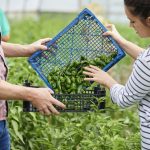Industrial agriculture has become a dominant force in food production, reshaping rural landscapes and communities across the globe. This shift towards large-scale farming operations has brought about significant changes, from economic opportunities to environmental challenges. Understanding the implications of industrial agriculture is crucial for fostering sustainable rural development and ensuring the well-being of local populations.
Understanding Industrial Agriculture’s Growth in Rural Areas
The rise of industrial agriculture in rural areas can be traced back to advancements in technology and changes in consumer demand. Driven by the need for efficiency and higher yields, farmers have increasingly adopted mechanized equipment, genetically modified organisms, and intensive farming techniques. This evolution has allowed producers to meet the growing demands of a globalized market, resulting in larger, consolidated farms that operate at scale.
These industrial operations often replace small family-run farms, which face difficulties competing against the lower prices and higher productivity of larger entities. As a result, many traditional agricultural practices are being abandoned, leading to a significant transformation in the social and economic fabric of rural communities. The allure of high profits and enhanced productivity draws farmers toward industrial methods, marking a departure from the region’s agrarian roots.
Moreover, the expansion of industrial agriculture has brought about an influx of investment in rural areas, with large agribusinesses establishing their presence. This often leads to improved infrastructure, such as transportation networks and storage facilities, which can benefit local economies. However, this growth can also create dependencies on multinational corporations, influencing local governance and agricultural policy in ways that may not align with community interests.
Economic Shifts: Jobs and Opportunities in Rural Communities
Industrial agriculture has created new job opportunities in rural communities, particularly in sectors related to processing, distribution, and machinery. For many, this expansion provides a pathway to stable employment and a chance to participate in a rapidly evolving agricultural economy. The promise of higher wages and improved working conditions compared to traditional farming can attract workers from urban areas, contributing to a diverse labor pool.
However, the growth of industrial agriculture also carries a paradox. While it generates jobs, the number of positions available often pales in comparison to those lost in the transition from small farms to large-scale operations. The mechanization of farming reduces the need for labor, leading to a concentration of wealth and job opportunities in certain sectors while simultaneously displacing many workers who are unable to transition into the new economy.
Furthermore, reliance on industrial agriculture can create economic vulnerabilities. When rural communities depend heavily on a single industry, they risk destabilization due to market fluctuations, environmental disasters, or corporate decisions made far from home. This economic concentration can stifle entrepreneurial spirit and inhibit the growth of diverse, sustainable local economies that are vital for long-term resilience.
Environmental Consequences of Industrial Farming Practices
The environmental impact of industrial agriculture is profound and multifaceted. Intensive farming practices, such as monocropping and excessive use of chemical fertilizers and pesticides, can lead to soil degradation, loss of biodiversity, and water pollution. These practices often compromise the health of local ecosystems, which are critical for maintaining the natural balance and providing essential services, such as clean water and air.
In addition to harming local environments, industrial agriculture contributes significantly to climate change. The sector is a major source of greenhouse gas emissions, primarily due to the energy-intensive nature of farming operations and the methane produced by large livestock operations. As rural areas grapple with the consequences of climate change, such as extreme weather events and shifting agricultural patterns, the sustainability of industrial agriculture becomes increasingly questionable.
Moreover, the reliance on industrial agricultural practices can lead to the displacement of traditional farming methods that promote environmental stewardship. Indigenous knowledge and practices, which have long sustained rural communities, are often overlooked in favor of more industrialized techniques. This loss not only erodes cultural heritage but also negatively impacts local ecosystems and the resilience of rural populations in the face of environmental challenges.
The Future: Balancing Agriculture and Community Well-Being
As rural communities navigate the complexities of industrial agriculture, finding a balance between economic growth and community well-being is essential. There is a growing recognition of the need for sustainable practices that prioritize both agricultural productivity and the health of local environments. Initiatives promoting organic farming, agroecology, and regenerative agriculture are gaining traction, offering alternatives to conventional methods.
Engaging local stakeholders in decision-making processes is crucial for fostering a more sustainable agricultural future. By empowering communities to actively participate in shaping agricultural policies, rural populations can advocate for practices that align with their values and needs. This can also involve supporting local food systems that prioritize shorter supply chains, thereby reducing environmental impact while boosting local economies.
Ultimately, the future of rural communities lies in their ability to adapt and innovate. By prioritizing sustainability and community engagement, it is possible to create a more balanced agricultural landscape that benefits both the economy and the environment. As rural areas continue to evolve, the challenge will be to integrate industrial agricultural practices with a commitment to community well-being, ensuring a thriving future for all stakeholders involved.
The impact of industrial agriculture on rural communities is a complex issue, marked by both opportunities and challenges. As the agricultural landscape continues to evolve, a thoughtful approach that considers environmental sustainability and community health will be vital. By fostering collaboration among farmers, policymakers, and local residents, it is possible to create an agricultural system that not only supports economic development but also nurtures the rural communities at its heart.








